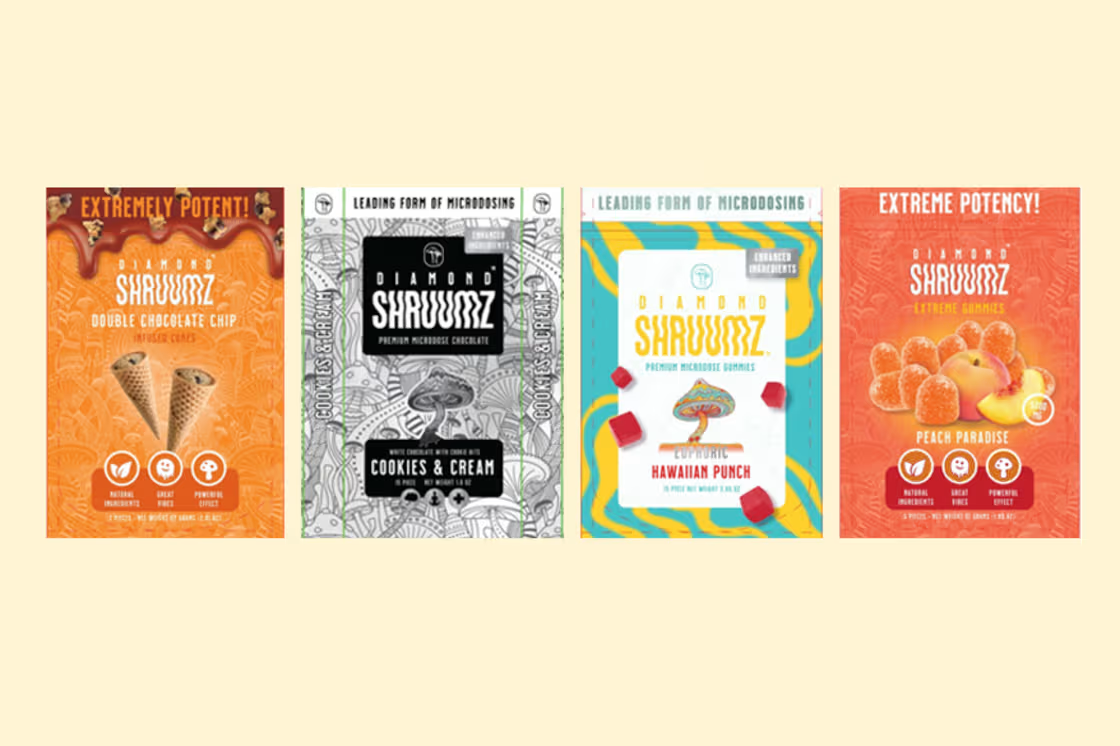Tryptomics In The News

Colorado Event Honors Best Psychedelic Products in the State
The 2nd annual Colorado Psychedelic Cup took place this past weekend at the Seawell Ballroom in the stunning and centrally located Denver Performing Arts Complex of downtown Denver, Colorado.

What's in All These Mushroom Edibles Popping Up in North Texas?
Christopher Pauli, cofounder of Tryptomics, said that the synthetic drug could be contaminated with toxic heavy metals and residual solvents. He also said some manufacturers are putting other synthetic substances in their mushroom products, such as 4-HO-MET and 4-Acetoxy-MET, which are also psychedelic.

Mushroom edibles are making people sick. Scientists still don't know why
Over the past year, Caleb King and Christopher Pauli have compiled a growing list of chemicals in various mushroom products. “People are throwing the kitchen sink into some of these and calling them a natural blend,” says King, who along with Pauli runs Tryptomics, a company that tests for psychoactive substances in natural products. The duo has examined more than 100 of these edibles — largely at the request of consumers — and has found herbal supplements, amphetamines and synthetic chemicals that are essentially spinoffs of popular hallucinogens.

Magic mushroom chocolates are having a moment. But do they even contain mushrooms?
Pauli said the company first became interested in testing these products when a client told him last December they had gotten sick after eating a mushroom chocolate bar. After that, Pauli said, “We did find quite a bit of chocolate bars that are either from smoke shops or different kinds of retailers that had 4-AcO-DMT.”

Mushroom Edibles are Rising in Popularity. It's Hard to Say What's in Them.
Christopher Pauli, CEO at Tryptomics, a lab that specializes in analyzing plants and fungi, said psilacetin is commonly found in mushroom edible products. Both psilacetin and psilocybin are converted in the body to psilocin, the chemical that is ultimately responsible for the psychoactive effects, he said.

Psychedelic Mushroom Edibles Promise Health Benefits. Be Wary, Experts Say.
Officials are amplifying warnings about the risks of unregulated and sometimes illegal products advertised on social media and sold online or in vape shops.

Tryptomics Founder Shares Vision of Psychedelics Tailored to Your Genetic Profile
Christopher Pauli is a molecular biologist who co-founded Tryptomics, a Colorado-based biotech that’s developing novel lab-testing technologies and services for plant medicines. One of the company’s focuses is to use pharmacogenomics and microbiomics to create highly personalized, bespoke psychedelic and natural medicines.

Deaths And Severe Illness Linked To Diamond Shruumz Products, Experts Blame Reckless Manufacturing Practices
As these products continue to grow in popularity, experts like Caleb King and Christopher Pauli of Tryptomics, a company that tests psychoactive substances, have seen a disturbing trend of inconsistency and contamination. "People are throwing the kitchen sink into some of these and calling them a natural blend," King told NPR. Their findings have included everything from herbal supplements to amphetamines, with little consistency even within the same brand.

Notes From the Underground Mushroom Market
Aside from their occasional tendency to cause vomiting and dizziness, muscimol isn’t known to present any serious health risks. But according to Chris Pauli and Caleb King, both of whom own and operate an analytical chemistry lab called Tryptomics based in Boulder, Colorado, much of what is currently being sold as muscimol on the market is likely being cut with other, potentially more harmful drugs.
“Some of the muscimol that’s coming into the United States is coming from China,” King told me, [and] some of the synthetic manufacturing in China is being done correctly, but others have brought in powdered substances that look a lot like muscimol and maybe have some effects that are similar to [its] sedative effects…but we’ve seen compounds like ketamine and an unknown phenethylamine that we didn’t recognize…That kind of shocked us.” Phenethylamines are a class of psychoactive compounds which includes stimulants like methamphetamine, as well as MDMA and the 2C class of psychedelics.

Mushroom edibles are tripping up users
The lack of regulation on the product is the biggest risk. "Somebody could slap a label on a package saying it contains four grams of mushrooms, and really, it contains a synthetic," Caleb King, one of the founders of Tryptomics, a Colorado lab that began testing mushroom chocolate bars bought at San Francisco vape shops, said to The Washington Post. "So it comes down to the consumer having to do their research before they're going to be consuming anything." Banning magic mushroom products would also not help the situation. "It's kind of like whack-a-mole, where if you prohibit psilacetin then something else might crop up," Mason Marks, a senior fellow at the Petrie-Flom Center for Health Law Policy, Biotechnology and Bioethics at Harvard Law School, said to NBC News. "Prohibition is not the solution, but educating people about this can be quite helpful."

24 Mushroom Companies to Pay Attention to in 2024
21. Tryptomics – This Colorado-based mushroom testing outfit does ‘elevated natural product research’ and his increasingly garnering traction for their innovative approach to educating the myco community about the importance of analytical testing of psychoactive mushrooms. They recently conducted an analytical test of multiple infamous ‘trap chocolate’ brands (mass underground / dubious quality chocolate) and shared the tests publicly, which returned less than desirable results for the brands in question.

Cultivation, chemistry, and genome of Psilocybe zapotecorum
Pauli recently shared how his background in Cannabis research led to this work, his viewpoints on current testing standards in psychedelics, and how plant medicines may have a greater impact on gut health than brain health.




